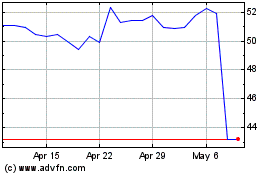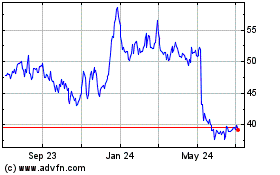Office Depot CEO's Answer to Retail Woes? Becoming an IT Help Desk
October 04 2017 - 4:27PM
Dow Jones News
By Michelle Ma
Office Depot Inc.'s $1 billion purchase of CompuCon Systems Inc.
plunges it into new territory, an effort to reposition itself as a
tech-support provider that isn't as dependent on selling printer
paper, toner and other office supplies.
Investors reacted harshly Wednesday, sending the stock down 15%.
Office Depot also warned of weak profits and lower sales in its
latest quarter, a reminder of its struggles to compete with
Amazon.com Inc. and others in its traditional business.
The CompuCon acquisition is the first big move by Office Depot's
Chief Executive Gerry Smith, who joined in February from computer
maker Lenovo Group Ltd. In an interview with The Wall Street
Journal on Wednesday, he discussed the strategy shift and the
future of the big-box chain.
Edited excerpts:
WSJ: This seems to be a reversal in strategy -- from doubling
down with a Staples merger to what seems like a push to minimize
your retail presence. Why the reversal?
Smith: I don't think I'm minimizing retail presence at all. I
think the last mile footprint is very valuable. Having 1,400
locations across the country is ripe for selling tech services.
We're going to lead with the services based approach when you walk
into the store...
Doing services is important because it's sticky and you don't
get into a bidding war from a transactional relationships
perspective. I think this is reinventing retail, not abandoning
retail.
WSJ: IT services is a highly competitive industry. How do you
foresee Office Depot making a dent in a crowded market?
Smith: CompuCon has 6,000 technicians that are salaried,
trained. A lot of competitors are outsourced. Do you want to
outsource to someone with no security clearance? No...They're going
to continue to serve their enterprise customers but we're also
going to [go after the small and medium business] space as
well...
In the space where CompuCon competes, they're No. 2 in market
share. There are a lot of people like CompuCon and 75% of the
market is completely fragmented.... 75% of people are below 1%
market share. They're tiny. As we build up this national footprint,
we think there's opportunity to consolidate the marketplace.
WSJ: Investors have reacted harshly to the news, your stock is
down like 15% today. What are you hearing from them today and what
are you telling them?
Smith: I'm not concerned about the short-term. We had an
earnings adjustment because we've had tremendous impact from the
hurricanes. Our biggest market is Florida... people don't buy
anything when they're worried about flooding...
We saw a dramatic drop off...in September. A big chunk was a
triple whammy [of the recent storms] from the earnings
perspective...It did have an impact but I'm also not shying away
from fact that we didn't execute back-to-school well.
WSJ: Long term, how much of your revenue do you foresee coming
from retail versus services? Is this the first of several such
deals?
Smith: It's the first major step. That means we're not done.
Internally we're doing cool things. We're also looking
inorganically at our core where can we build and grow this
business. Our goal is to grow the services piece faster. This is a
necessary pivot for us to be a highly valued company in the
future.
WSJ: How is this going to change your physical stores?
Smith: We will have a dramatic change in appearance of our
stores going forward. The first one in Austin in December. Another
one in California early in Q1...You're going to see a physically
different experience. You want customers who go into Office Depot
who say I want business services, tech services, potentially shared
office space, potentially supply chain services. We're going to
feature that in the front of the store.
(END) Dow Jones Newswires
October 04, 2017 16:12 ET (20:12 GMT)
Copyright (c) 2017 Dow Jones & Company, Inc.
ODP (NASDAQ:ODP)
Historical Stock Chart
From Apr 2024 to May 2024

ODP (NASDAQ:ODP)
Historical Stock Chart
From May 2023 to May 2024
